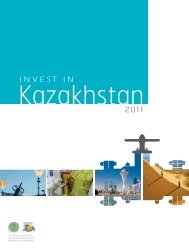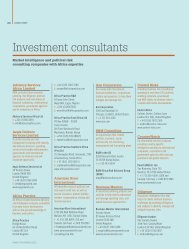NIGERIA Invest in 2012-13 - Newsdesk Media
NIGERIA Invest in 2012-13 - Newsdesk Media
NIGERIA Invest in 2012-13 - Newsdesk Media
You also want an ePaper? Increase the reach of your titles
YUMPU automatically turns print PDFs into web optimized ePapers that Google loves.
The dramatic growth of the<br />
Nigerian film <strong>in</strong>dustry to become<br />
the second largest <strong>in</strong> the world has<br />
had a profound effect on the<br />
country. Martyn Cornell considers<br />
the wider impact of the<br />
phenomenon that is ‘Nollywood’<br />
The s<strong>in</strong>gle most visible mark of<br />
success for the Nigerian<br />
film <strong>in</strong>dustry, accord<strong>in</strong>g to<br />
John Ugbe, manag<strong>in</strong>g director<br />
of digital satellite television<br />
operator Multichoice Nigeria, is “when you<br />
land <strong>in</strong> Kenya or any other African country,<br />
and the first guy you see says, ‘Oga’” – the<br />
Nigerian slang word mean<strong>in</strong>g ‘boss’.<br />
The fact that much of Africa now knows<br />
what ‘oga’ means is a tribute to what has<br />
<strong>in</strong>evitably been dubbed ‘Nollywood’ – and to<br />
Nigeria’s <strong>in</strong>credible output,<br />
currently runn<strong>in</strong>g at around<br />
900 films a year. Nigeria was<br />
hailed by UNESCO, the<br />
United Nations Educational,<br />
Scientific and Cultural<br />
Organisation, <strong>in</strong> 2009 as the<br />
home of the second-biggest<br />
film <strong>in</strong>dustry on the planet <strong>in</strong><br />
terms of sheer output, just<br />
beh<strong>in</strong>d India’s ‘Bollywood’<br />
and far ahead of Hollywood<br />
itself, at around 480 films a year.<br />
A report by UNESCO on the world film<br />
<strong>in</strong>dustry found that while some 56 per cent<br />
of Nollywood films are made <strong>in</strong> local<br />
languages, the rest are <strong>in</strong> English. This is<br />
an important factor <strong>in</strong> Nigeria’s success<br />
<strong>in</strong> export<strong>in</strong>g its films to the rest of Africa, and<br />
its potential for further growth as a supplier of<br />
films not just to Africa but to the world.<br />
The rise of Nollywood has been<br />
explosive, from a stand<strong>in</strong>g start <strong>in</strong> the early<br />
1990s to an <strong>in</strong>dustry worth upwards of<br />
N25 billion ($157 million) a year and<br />
reckoned, depend<strong>in</strong>g on which source you<br />
MEDIA, TOURISM AND CULTURE 161<br />
read, to be Nigeria’s second-largest employer<br />
after either the federal government or the oil<br />
<strong>in</strong>dustry. As the British-Nigerian actor Maynard<br />
Eziashi told Nigeria’s Vanguard magaz<strong>in</strong>e <strong>in</strong><br />
January <strong>2012</strong>, “If we compare the first 10 to<br />
20 years of Hollywood with that of Nollywood<br />
you would realise Nollywood is do<strong>in</strong>g fabulously<br />
well.” There is even a Centre for Nollywood<br />
Studies, part of the School of <strong>Media</strong> and<br />
Communication at the Pan-African University<br />
<strong>in</strong> Lagos, which opened <strong>in</strong> July 2011.<br />
Paradoxically, this success has come <strong>in</strong><br />
a country with virtually no formal c<strong>in</strong>emas –<br />
99 per cent of screen<strong>in</strong>gs take place <strong>in</strong><br />
<strong>in</strong>formal sett<strong>in</strong>gs, such as home c<strong>in</strong>emas. Far<br />
from be<strong>in</strong>g a threat to the Nigerian film<br />
<strong>in</strong>dustry, the lack of a formal network of mass<br />
c<strong>in</strong>ema outlets has been an opportunity:<br />
Nigeria’s film-makers have been able to film<br />
straight to video, massively reduc<strong>in</strong>g their<br />
costs. A s<strong>in</strong>gle film might be shot <strong>in</strong> as little<br />
A film might be shot <strong>in</strong> as<br />
little as two weeks or a<br />
month, us<strong>in</strong>g cheap digital<br />
cameras and locals as extras<br />
as two weeks or a month, much of it out on<br />
the streets, us<strong>in</strong>g cheap digital cameras<br />
and locals as extras (their ‘pay’ a promise of<br />
a copy of the f<strong>in</strong>ished DVD) and for a total<br />
cost of no more than N5 million ($31,506).<br />
Hundreds of thousands of DVD copies are<br />
then sold back on those same streets at<br />
around N250 ($1.58) a time.<br />
Although the history of film-mak<strong>in</strong>g<br />
<strong>in</strong> Nigeria goes back at least as far as 1935,<br />
when parts of the Zoltan Korda film,<br />
Sanders of the River, were shot on location<br />
<strong>in</strong> the country, the first major Nollywood<br />
film is reckoned, by common consent, to be<br />
INvEST IN <strong>NIGERIA</strong> <strong>2012</strong>-<strong>13</strong>







